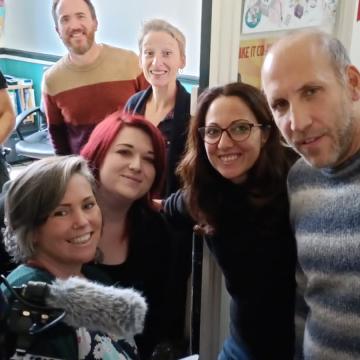Guest blog: How is Suma Wholefoods moving towards its Net Zero ambition?
Blog post

Read a guest blog from Suma Wholefoods about its ambitious Sustainability Strategy.
As a wholesaler distributing vegetarian wholefoods and responsibly sourced body care and household goods around the country, we’re acutely aware of our emissions and the fact we operate a fleet of 21 trucks, writes Suma Wholefoods' worker-owner Rebecca Kinnard. This means that one of our key areas of focus in our Sustainability Strategy is our Net Zero ambition:
“Suma will reach Net Zero greenhouse gases (GHGs) for our scope 1 and 2 emissions by 2035 and Net Zero scope 3 emissions as soon as we can after that. We will confirm our scope 3 GHG emissions reduction targets by 2024.”
We’re pleased to say that work is almost done on our Scope 3 emissions reporting, and the full update will be published in May this year. As we expected, this is a big piece of work, digging into data that covers all of our operations outside of our direct (Scope 1) and indirect emissions (from purchased energy - Scope 2). Scope 3 is everything else such as business travel, investments, use of sold products and waste disposal.
The team gathered all the financial data for the year to allocate our budgetary spends into specific industry emissions categories, which gives us an overall supply chain footprint (spend-based) so we can see which areas we are having the biggest environmental impact through our purchasing decisions.
The team spent time with finance to gather all the budgetary information, then worked out which category it needed to be reported under, allocating spending in each area. This is now being sent to our carbon consultants who will hopefully be able to confirm our emissions. Phew!
So, what about our fleet? We have our two biogas trucks which run on 100% Renewable Biomethane produced from food, animal and water waste, and each reduces emissions by around 84% compared with diesel trucks. We successfully started operating out of our new South West hub which we are trialling, meaning we’re reducing delivery miles as we can trunk goods down there and then make shorter deliveries from the hub.
70,000 reasons to back co-operatives
As a worker cooperative, we’re all about supporting our people to make positive choices too. We’re happy to say we’ve not only launched our Electric Vehicle salary sacrifice scheme but already five people have signed up and are now commuting to work in their shiny new electric vehicles. The feedback has been really positive so far, people are seeing the benefits already.
The next step is getting the charging points installed, there is lots to consider such as location, how the electricity is paid for and how many we need. As with lots of this work, challenges crop up and we sometimes have to change our expectations but we’ve always been good at rolling with the unexpected and our workers all pull together to move forward. We’d love to say we were closer to getting electric vehicles in our truck fleet, but although research is ongoing we’re still not quite there yet.
One of our other themes is zero waste. This is something we’ve been passionate about for years, so we already had lots of processes in place to prevent our food and packaging waste from going to landfill. In particular, food waste is diverted across our canteen, donations to food banks and charities, and used by Suma workers where possible. For the small percentage of food waste (around 8%) we cannot divert, this is collected and sent to an anaerobic digestion facility where it produces bioenergy.

Recently some workers spent time with our friends Surplus to Purpose in Leeds, who intercept food destined for landfill and divert it across charities and make it available for the general public, as well as using it for catering events. Following the visit, we have a new partnership with them which will see us taking delivery of fruit, vegetables and bread which were deemed ‘waste’ by the shops and supermarkets. They go through a strict QC process before we get them, and we’ll be using them to cook up a storm in our canteen. Bring on the wonky and wonderful carrots and potatoes.
For our full Sustainability Impact Report, keep an eye out in May when we’ll have all the facts, figures, successes and challenges ready to share.
Suma to star in TV documentary

70,000 reasons for government to back co-operatives: A blog

Sign up for Co-operatives UK newsletters

The Co-operative and Mutual Economy

